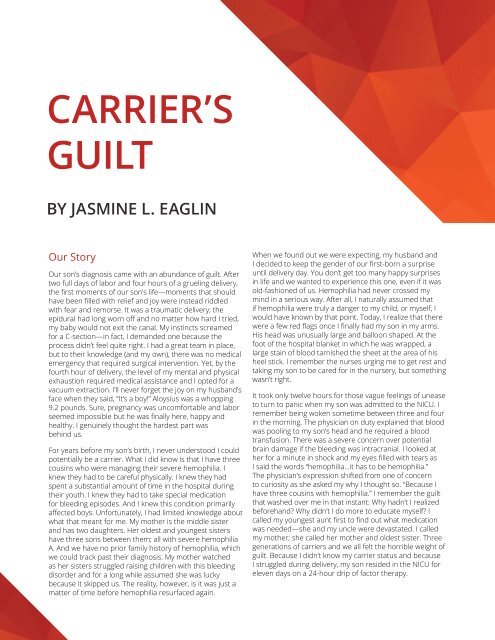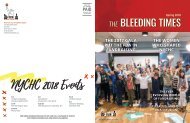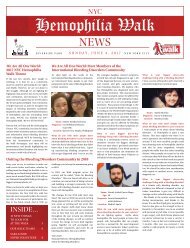The Bleeding Times- Spring 2017
New York City Hemophilia Chapter's print magazine, The Bleeding Times, is now available online!
New York City Hemophilia Chapter's print magazine, The Bleeding Times, is now available online!
You also want an ePaper? Increase the reach of your titles
YUMPU automatically turns print PDFs into web optimized ePapers that Google loves.
CARRIER’S<br />
GUILT<br />
BY JASMINE L. EAGLIN<br />
Our Story<br />
Our son’s diagnosis came with an abundance of guilt. After<br />
two full days of labor and four hours of a grueling delivery,<br />
the first moments of our son’s life—moments that should<br />
have been filled with relief and joy were instead riddled<br />
with fear and remorse. It was a traumatic delivery; the<br />
epidural had long worn off and no matter how hard I tried,<br />
my baby would not exit the canal. My instincts screamed<br />
for a C-section—in fact, I demanded one because the<br />
process didn’t feel quite right. I had a great team in place,<br />
but to their knowledge (and my own), there was no medical<br />
emergency that required surgical intervention. Yet, by the<br />
fourth hour of delivery, the level of my mental and physical<br />
exhaustion required medical assistance and I opted for a<br />
vacuum extraction. I’ll never forget the joy on my husband’s<br />
face when they said, “It’s a boy!” Aloysius was a whopping<br />
9.2 pounds. Sure, pregnancy was uncomfortable and labor<br />
seemed impossible but he was finally here, happy and<br />
healthy. I genuinely thought the hardest part was<br />
behind us.<br />
For years before my son’s birth, I never understood I could<br />
potentially be a carrier. What I did know is that I have three<br />
cousins who were managing their severe hemophilia. I<br />
knew they had to be careful physically. I knew they had<br />
spent a substantial amount of time in the hospital during<br />
their youth. I knew they had to take special medication<br />
for bleeding episodes. And I knew this condition primarily<br />
affected boys. Unfortunately, I had limited knowledge about<br />
what that meant for me. My mother is the middle sister<br />
and has two daughters. Her oldest and youngest sisters<br />
have three sons between them; all with severe hemophilia<br />
A. And we have no prior family history of hemophilia, which<br />
we could track past their diagnosis. My mother watched<br />
as her sisters struggled raising children with this bleeding<br />
disorder and for a long while assumed she was lucky<br />
because it skipped us. <strong>The</strong> reality, however, is it was just a<br />
matter of time before hemophilia resurfaced again.<br />
When we found out we were expecting, my husband and<br />
I decided to keep the gender of our first-born a surprise<br />
until delivery day. You don’t get too many happy surprises<br />
in life and we wanted to experience this one, even if it was<br />
old-fashioned of us. Hemophilia had never crossed my<br />
mind in a serious way. After all, I naturally assumed that<br />
if hemophilia were truly a danger to my child, or myself, I<br />
would have known by that point. Today, I realize that there<br />
were a few red flags once I finally had my son in my arms.<br />
His head was unusually large and balloon shaped. At the<br />
foot of the hospital blanket in which he was wrapped, a<br />
large stain of blood tarnished the sheet at the area of his<br />
heel stick. I remember the nurses urging me to get rest and<br />
taking my son to be cared for in the nursery, but something<br />
wasn’t right.<br />
It took only twelve hours for those vague feelings of unease<br />
to turn to panic when my son was admitted to the NICU. I<br />
remember being woken sometime between three and four<br />
in the morning. <strong>The</strong> physician on duty explained that blood<br />
was pooling to my son’s head and he required a blood<br />
transfusion. <strong>The</strong>re was a severe concern over potential<br />
brain damage if the bleeding was intracranial. I looked at<br />
her for a minute in shock and my eyes filled with tears as<br />
I said the words “hemophilia…it has to be hemophilia.”<br />
<strong>The</strong> physician’s expression shifted from one of concern<br />
to curiosity as she asked my why I thought so. “Because I<br />
have three cousins with hemophilia.” I remember the guilt<br />
that washed over me in that instant: Why hadn’t I realized<br />
beforehand? Why didn’t I do more to educate myself? I<br />
called my youngest aunt first to find out what medication<br />
was needed—she and my uncle were devastated. I called<br />
my mother; she called her mother and oldest sister. Three<br />
generations of carriers and we all felt the horrible weight of<br />
guilt. Because I didn’t know my carrier status and because<br />
I struggled during delivery, my son resided in the NICU for<br />
eleven days on a 24-hour drip of factor therapy.<br />
Carrier’s Guilt<br />
When you find out you’re a carrier and realize you’re<br />
essentially responsible for your child’s rare diagnosis,<br />
mothers tend to feel distress. Everything changes from<br />
that moment forward. What really lies ahead? What kind<br />
of life will your sons have? Will your daughters have to<br />
go through this ordeal all over again? For some, even the<br />
decision to expand your family is agonizingly scrutinized for<br />
months and maybe even years. Is it the right choice for you<br />
and your family? How will you manage this new world of<br />
hemophilia on top of your daily challenges?<br />
It’s okay to have all the feelings we experience as carrier<br />
moms. <strong>The</strong> entire process from grieving to acceptance to<br />
proactively tackling hemophilia head on has allowed me to<br />
grow in a manner I would have never anticipated otherwise.<br />
What we have to remember is that today, we have access<br />
to a wealth of knowledge and medical research that<br />
was not otherwise available to others in the hemophilia<br />
community only thirty years ago. <strong>The</strong> advancements of<br />
factor medications, the options for prophylactic treatment,<br />
the flexibility to infuse at home, the medical support from<br />
our Hemophilia Chapters and Associations, and even the<br />
emotional support from online communities devoted<br />
to families managing bleeding disorders. Hemophilia<br />
and other bleeding disorders are regarded in much<br />
different standings than they were three decades ago.<br />
This condition is not a death sentence and no longer the<br />
taboo it was in the 1980s. Families today educate, advocate<br />
for, and support one another throughout this journey.<br />
<strong>The</strong> resources at our disposal are incredible luxuries<br />
that my aunts and cousins were not fortunate enough to<br />
experience in childhood.<br />
<strong>The</strong> old cliché that “knowledge is power” is undeniably true.<br />
Additionally, being proactive is incredibly conducive to the<br />
positive experiences you have on your personal journey.<br />
If at any point in your family’s history hemophilia has been<br />
suspected, get yourself tested and confirm your carrier<br />
status. If you’re a carrier with young daughters, educate<br />
them well and find out their status early. Research has<br />
uncovered that carriers are often symptomatic or can<br />
become symptomatic as we age through adulthood—an<br />
experience my mother is going through now, but her<br />
sisters fortunately are not. <strong>The</strong> more knowledge you have<br />
of your family, the better you can plan for basic milestones<br />
such as tooth extractions, pregnancies, surgeries, and<br />
medical emergencies.<br />
Conclusion<br />
I am here to say that even with all that my husband and I<br />
have experienced in our son Aloysius’ birth and diagnosis,<br />
we couldn’t be happier with our journey. Aloysius is now<br />
just over three years old. He is a brilliant little big guy<br />
on prophylaxis. Through his cooperation and our sheer<br />
determination, my husband and I have learned to infuse at<br />
home. Aloysius is very active, loves swimming, swings at the<br />
park, jumping off the living room sofa, listening to music,<br />
and eating pizza and chocolate. He’ll be starting pre-k in<br />
September, so my anxieties kick in as we enter this new<br />
unknown phase of our journey, but a big part of me knows<br />
he’ll be just fine as long as we continue to do our part.<br />
I certainly understand the guilt that comes with being a<br />
carrier, but we have learned everything we could from our<br />
past mistakes and continue to keep abreast on emerging<br />
research regarding the future of hemophilia. My family will<br />
continue to learn and adapt; please know that yours<br />
will, too.<br />
10 11







